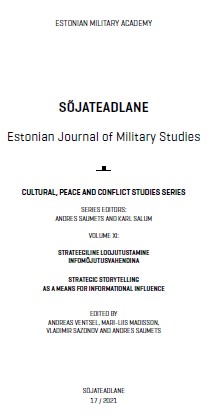ANTITEETILINE IDENTITEEDILOOME VENEMAA FÖDERATSIOONI STRATEEGILISTES NARRATIIVIDES
ANTITHETICAL IDENTITY FORMATION IN THE STRATEGIC NARRATIVES OF THE RUSSIAN FEDERATION
Author(s): Daniel TammSubject(s): Government/Political systems, International relations/trade, Security and defense, Political behavior, Politics and communication
Published by: Kaitseväe Akadeemia (KVA)
Keywords: identity; strategic narrative; security dilemma; Russian foreign policy; semiotic theory of hegemony;
Summary/Abstract: This article serves three main goals. The first goal is largely theoretical as the article seeks to develop an original framework of analysis, connecting collective identity formation with strategic narratives. According to Ernesto Laclau and Chantal Mouffe from the Essex School of Discourse Analysis, political identities always entail a form of antagonism, a type of exclusion. Connecting this notion with the framework of the Tartu–Moscow Semiotic School allows me to delineate how the nature of such an exclusion can be used to interpret the goals of these narratives. In the present case, I will focus my efforts on antithetical identity: the idea of a collective “self ” being first and foremost perceived in relation with its polar opposite. As a strategic narrative, antithetical identity formation entails a specific form of projection: the image of an enemy is first created internally and then used to consolidate the power of a given hegemon. The second goal of the article is to demonstrate the ways in which an antithetical identity formation can become dangerous to others and how this threat can be dealt with. First, I will outline the ways in which the discursive strategies of 1) semiotic disarming, 2) discursive mimicry, 3) preventive projection, 4) moral victimisation, and 5) justified aggression are used to legitimate attacks against alleged adversaries and as a means to avoid blame. Then, I will illustrate how an antithetical identity can lead to a security dilemma and how this can be alleviated by applying an inverted reading model of the narrative. The third goal of the article is to argue that the forces guiding Russian foreign policy towards the West can be better understood through the lens of an antithetical identity formation. Relying on numerous secondary sources, I will investigate the strategic narratives of 1) “the Russophobic West”, 2) Russia as a “besieged fortress“, and 3) Russia as the ruler of the “Russian world”. Drawing from these, I will interpret the narratives of 4) “Ukraine as a fascist state”, and 5) “the European Union in decay” that have been used to justify Russian aggression towards the two.
Journal: Sõjateadlane
- Issue Year: 2021
- Issue No: 17
- Page Range: 90-118
- Page Count: 29
- Language: Estonian

